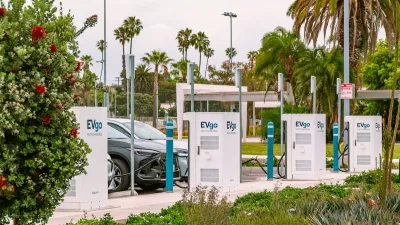Local zoning codes can be adjusted to encourage the building of EV charging infrastructure into neighborhoods.

In an article for the New York Law Review, Anthony S. Guardino outlines the zoning and regulatory challenges faced by municipalities hoping to shift to electrified vehicle infrastructure.
“In order to facilitate and encourage more EV charging stations, municipalities need to update their zoning ordinances to regulate and manage this new land use. Zoning code amendments should provide developers and property owners with clear guidance on the manner in which applications for charging stations will be processed and the timing of approvals, so that the process is more predictable.”
The article suggests that cities can include EV charging requirements in building codes, pass ordinances that facilitate charging facilities in neighborhoods, and streamline approval processes for EV charging stations. “Some New York municipalities have updated their zoning ordinances to address the above questions by designating EV charging stations to be permitted principal uses in commercial and industrial districts, or by allowing EV charging to be located in all zoning districts as permitted accessory uses.”
The article concludes that, as EV adoption grows, cities should proactively update their zoning codes to account for electric vehicle infrastructure.
FULL STORY: Thorny Zoning Questions Posed by EV Charging Stations

Alabama: Trump Terminates Settlements for Black Communities Harmed By Raw Sewage
Trump deemed the landmark civil rights agreement “illegal DEI and environmental justice policy.”

Planetizen Federal Action Tracker
A weekly monitor of how Trump’s orders and actions are impacting planners and planning in America.

How Atlanta Built 7,000 Housing Units in 3 Years
The city’s comprehensive, neighborhood-focused housing strategy focuses on identifying properties and land that can be repurposed for housing and encouraging development in underserved neighborhoods.

In Both Crashes and Crime, Public Transportation is Far Safer than Driving
Contrary to popular assumptions, public transportation has far lower crash and crime rates than automobile travel. For safer communities, improve and encourage transit travel.

Report: Zoning Reforms Should Complement Nashville’s Ambitious Transit Plan
Without reform, restrictive zoning codes will limit the impact of the city’s planned transit expansion and could exclude some of the residents who depend on transit the most.

Judge Orders Release of Frozen IRA, IIJA Funding
The decision is a victory for environmental groups who charged that freezing funds for critical infrastructure and disaster response programs caused “real and irreparable harm” to communities.
Urban Design for Planners 1: Software Tools
This six-course series explores essential urban design concepts using open source software and equips planners with the tools they need to participate fully in the urban design process.
Planning for Universal Design
Learn the tools for implementing Universal Design in planning regulations.
Jessamine County Fiscal Court
Caltrans
Institute for Housing and Urban Development Studies (IHS)
City of Grandview
Harvard GSD Executive Education
Toledo-Lucas County Plan Commissions
Salt Lake City
NYU Wagner Graduate School of Public Service





























